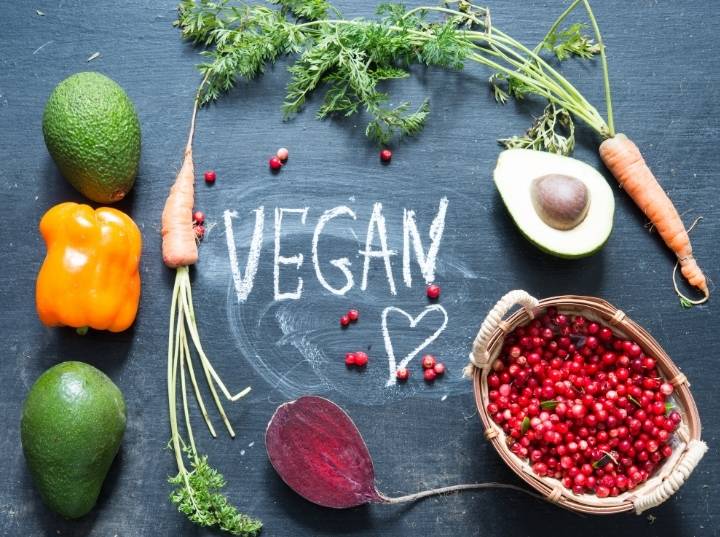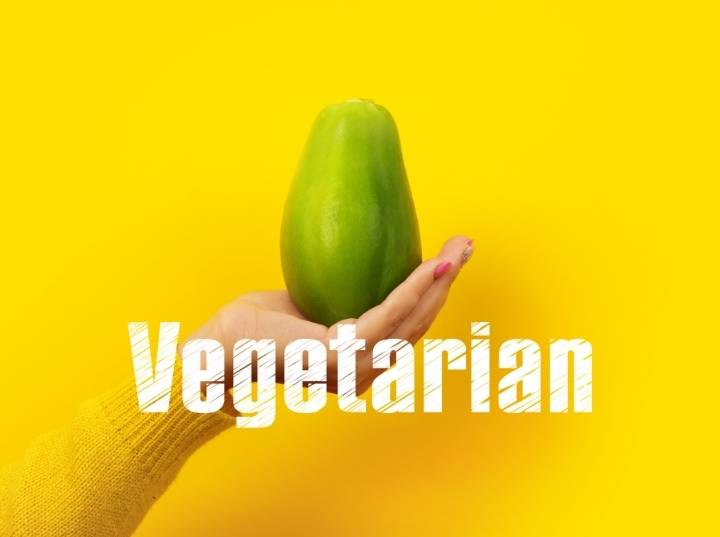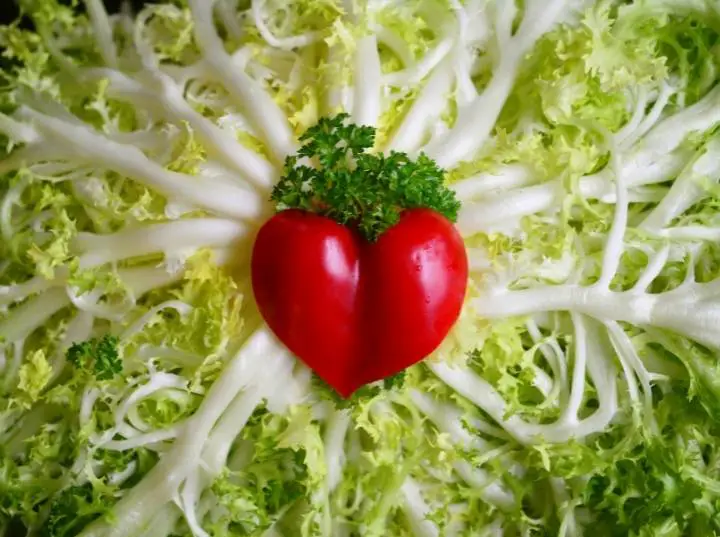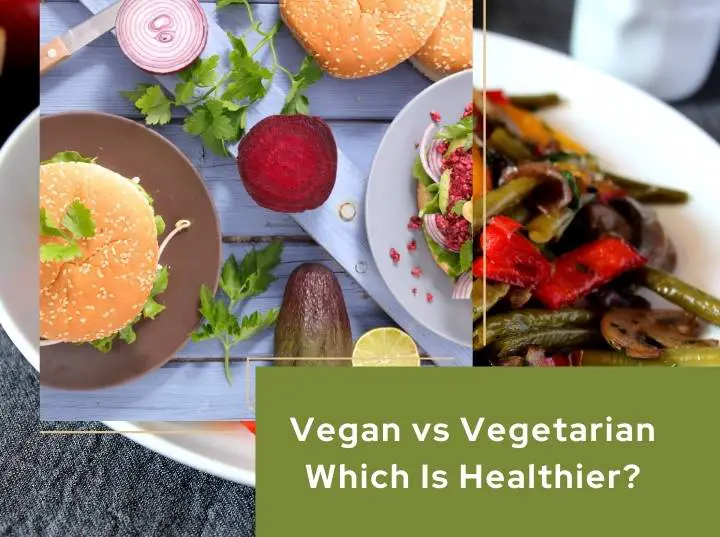Recently, the trend of vegetarianism is growing. Vegetarian diets are very diverse. The two most popular vegetarian diets today are vegetarian and vegan.
Let’s learn the definition of vegan and vegetarian so that you can choose the right, best diet for your health.
Definition of vegan and vegetarian
There are many different vegetarian diets. Everyone can choose a vegetarian diet that is to suit their needs.
Each vegetarian diet will have its own unique characteristics. To help people better understand this topic, let’s explore the definition of each mode.
#1. What is vegan?
Veganism is also known as a form of vegetarianism. With this mode, the operator will not use any products or by-products from animals. Vegetarians adhere to a strict diet.
The daily menu of vegetarians will not include dishes with animal ingredients such as: veal, beef, pork, fish, aquatic, seafood or insects…

They will also not eat animal products such as honey, eggs, milk, etc. Some effects of animal origin include fat, animal protein, rennet, gelatin… as well. It will never appear on a vegetarian menu.
In addition to the diet, vegans also apply a “no to animal products” in their lifestyle. They will not use any animal products.
Vegetarians will never buy bags, purses, shoes, etc. made from leather or any other animal part. Even fabrics, silk, made from animal products, never appear in the wardrobe of vegans.
They will avoid using soaps in daily life, beeswax containing animal fat or latex products derived from milk protein. They also oppose and do not use cosmetics that use ingredients related to animals or tested on animals.
In general, people who choose to be vegan often have strict requirements. It is not only reflected in their diet but also their lifestyle and living habits.
Vegans will follow the school of not using food, products, and utensils from animals. They are people who want to repel and limit the killing of animals.
#2. What is the concept of a vegetarian diet?
Vegetarianism simply means a diet that does not use foods from animal meat: cattle, poultry, seafood, fish, shrimp, crab…
Vegetarianism helps limit the killing of animals. However, vegetarians can eat foods that are products and preparations of animals.

There are different methods of fasting. In each method, the performer needs to abstain from specific foods:
- Vegetarian Lacto-Ovo (or ovo-lacto): In Latin, this word means milk and eggs. People who follow this diet do not eat animals, seafood but can eat eggs and milk.
- Lacto Vegetarian: People who choose this diet will be able to eat dairy products but not eggs, meat, poultry, or seafood.
- Ovo-style vegetarian: In this mode, the practitioner will eat eggs and egg products but do not use milk, dairy products, and animal meat, seafood.
Compare vegan and vegetarian
In order for everyone to better understand these two definitions, let’s compare to find out the similarities and differences between them. So, what is the difference between vegan and vegetarian?
Vegan and vegetarian are both diets that limit foods of animal origin. These two methods are to limit the slaughter of animals. And they have in common that they all have health benefits.
These two modes focus on using foods of plant origin. The corresponding group of valuable plants supplements the lack of nutrients from animals.

From the information in the definition of vegan and vegetarian, you can already see the difference between them. Vegans often do not use foods and products of animal origin.
Meanwhile, vegans just don’t use foods derived from animals. The rest, animal products such as dairy eggs or products of animal origin, are still on the menu of vegetarians.
Each vegetarian diet will abstain from different foods. But basically, veganism is absolutely saying no to everything that has to do with animals. Vegetarians can often still use products from them.
Advantages and disadvantages of each type of vegetarian
Both vegan and vegetarian diets have their own positives and negatives. To be able to choose the right method for you, you need to learn about the pros and cons of each
1.Vegan Diet
- Advantages
Veganism helps to minimize the killing of animals. Do not use food, animal products to help the body digest better. Vegans also will not have to load the body with substances that are difficult to metabolize.
Therefore, veganism helps limit cardiovascular diseases and blood pressure. Vegan helps to purify the body and be healthier.
Interestingly, participants on the vegan diet lost more weight than those on the calorie-restricted diet. It is even when the vegan groups were to eat until they felt full.
A recent small study comparing the weight loss effects of five different diets. It concluded that vegetarian and vegan diets were as well accepted as semi-vegetarian and standard Western diets.
- Defect
However, with strict diets, vegans are often prone to nutritional deficiencies. Some nutrients that vegans need to supplement include B vitamins, iron, Vitamin D, calcium, and protein.
Without building a scientific, healthy vegan menu is very likely to be counterproductive. It can harm health.
2. Regular vegetarian diet
- Advantages
With a regular vegetarian diet, it’s easy to find ingredients for meals. You can still use some foods from animal products and preparations. The nutritional source of vegetarians is richer and more complete.
Vegetarianism is generally very healthy. It basically helps to limit the risk of diseases like veganism.
Vegan diets lower blood sugar levels in diabetics more than diets from the American Diabetes Association (ADA).
In one study, 43% of participants following a vegan diet were able to reduce their dose of blood sugar-lowering medication.
- Defect
The drawback of a vegetarian diet is that you still take in, and some nutrients are difficult for the body to break down.
Vegetarians still carry the risk of nutrient deficiencies. Therefore, people also need to pay attention to the foods included in their menu to supplement nutrients.
Tips to healthy vegetarian and vegan diets
While veganism and vegetarianism have health benefits, their downsides cannot be denied. Therefore, it is best to adjust your vegetarian diet to maintain nutrients for your body.
Many things to bear in mind for a healthy vegetarian and vegan diet:
- A healthy vegetarian diet needs to ensure some basic elements such as: building a plant-based diet but consuming a variety of foods from animals, not dieting, not eliminating.
- Drink 2-3 liters of water every day and create a habit of exercise. Take time to jog, go for a walk to expose your body to sunlight, and breathe fresh air.
- A healthy vegetarian diet must ensure science. It means you have to determine which group of nutrients you lack from animals. Then, choose plant-based foods that contain that group of substances to include in your daily menu.
- To be a healthy vegetarian, you also need to be mindful of how food is prepared. Prioritize cooking methods that are good for health and retain the nutritional value of food.
Vegan vs Vegetarian Which is Healthier?
Many studies confirm that veganism and vegetarianism often have health benefits. However, it’s hard to say which of these two regimens is healthier.
Studies also show that vegans are generally healthier. They have a lower risk of cardiovascular disease, diabetes, and blood pressure than vegetarians.
However, vegans with extreme diets are at risk of nutrient deficiencies. In fact, all nutrients from animals can be replaced by green food.
Vegetarianism still ensures that the body can absorb some nutrients from animal products such as eggs and milk.
These two diets will be good for health if people understand it well and apply a healthy, balanced vegetarian diet.
Frequently Asked Questions
In addition to the questions about the difference between the two definitions, people ask many other questions. Some related questions on the topic of vegetarianism that many people are into include:
- Should I be a vegetarian or not?
Any form of vegetarianism has its own pros and cons. Therefore, whether to be vegetarian or not depends on the needs of each person.
If you feel interested, you can use vegetarian foods. You don’t need to fast every day. You can choose certain days to eat vegetarian food.
Fasting also has many health benefits and benefits. You can build healthy vegetarian menus to enrich your meals.
- Do Vegans Eat Cheese?
People think that cheese is suitable for vegetarians. So do vegans eat cheese?
Some cheeses contain the gastric juices of animals. Therefore, with a strict “no to animal products” diet, vegans will not use cheese.
- Are vegetarians healthier?
Is vegan or vegetarian better? As analyzed above, vegetarian and vegan diets can be healthy. However, with limited use of many foods, vegetarians, especially vegans, are lacking in essential nutrients.
To ensure health, vegetarians need to find and replace nutrients of animal origin.
- Do vegetarians eat rice?
Many people wonder if vegans eat rice or not. According to the definition of vegan, these people will not use animal products and preparations.
Rice is a portion of plant-based food. Therefore, vegans still use rice in their daily menu. This food also provides a number of important nutrients needed by the body.
- Should I be a vegetarian or a vegan?
Vegan and vegetarian – which diet to choose is a topic of great interest to many people. To decide which vegetarian diet to choose, you need to understand the characteristics of each.
You should know the pros as well as cons of each model. At the same time, you also need to determine your own health and body to choose a suitable vegetarian diet.
Choosing vegan or vegetarian depends on what your body adapts to. Whichever model you choose, you need to ensure your health.
The vegan diet is pretty harsh. Therefore, if you are new, you should start with a vegetarian diet first. Then, depending on your health situation, you can gradually switch to vegan.
- How do I get enough vitamin B12?
Vitamin B12 is only available in foods of animal origin, so sources of this vitamin for vegans are very limited and they will need to take a supplement. If you eat dairy products and eggs, you’re probably getting enough vitamin B12.
Good sources of vitamin B12 for vegans include:
- Yeast extract, such as Marmite, which is with vitamin B12
- Breakfast cereals with vitamin B12
- Soybean products fortified with vitamin B12
- Is it healthier to eat organic fruits and vegetables?
The vitamin and mineral content of foods varies, depending on factors such as the type of soil, when the vegetables are harvested, and how they are stored. There is currently no scientific evidence that organic foods are healthier.
Eating organic food is a personal choice and many people choose to do so for environmental reasons. The most important thing is to eat as many vegetables and fruits as possible, regardless of whether they are organic or not.
Conclusion
Vegan and vegetarian are both diets that limit the use of foods from animals. Each mode will have different characteristics. These two vegetarian diets also have certain advantages and disadvantages.
Learn about the characteristics of each model and choose based on the suitability for your body. We wish you a healthy, healthy vegetarian diet.


